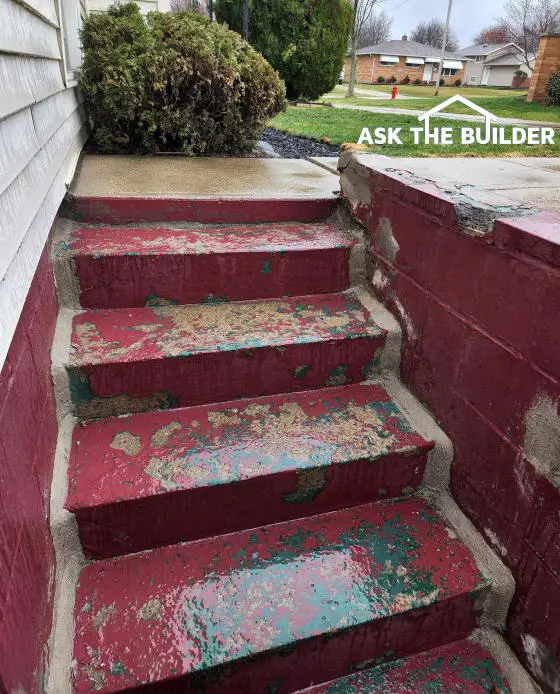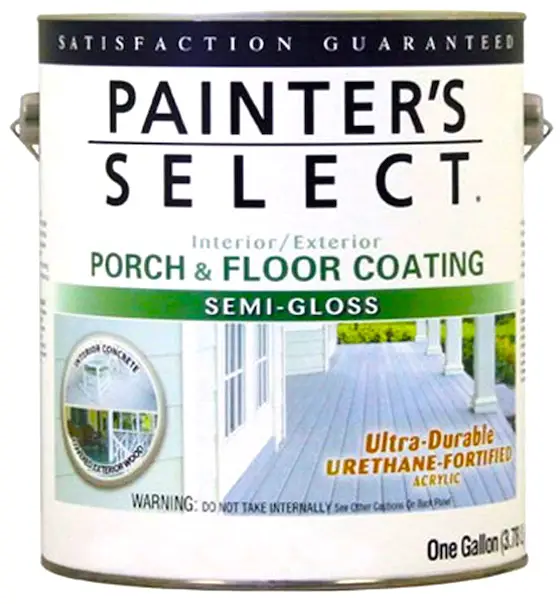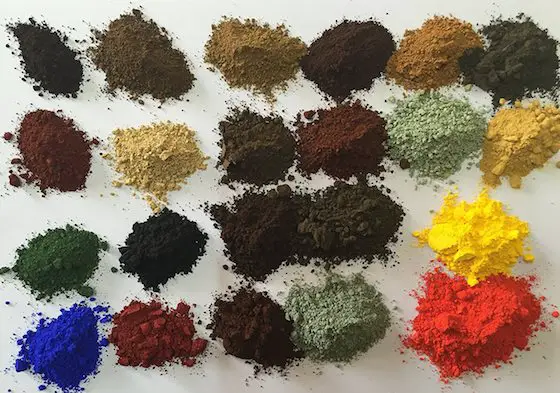Concrete Gray Color

Concrete Gray Color - Many don't like the bland gray color of standard concrete. There’s a better way to revitalize these steps and add color to concrete. Beware of painting concrete as it presents a dangerous slip hazard. Copyright 2022 Tim Carter
Concrete Gray Color Can Be Any Color!
Each day during the spring, I receive quite a few emails via the Ask Tim page on my website. One of the common themes, believe it or not, is to add color to concrete. You may be like many that dislike the drab gray color of concrete. A majority of homeowners want to paint garage floors, steps, patios, and even sidewalks.
Painting Concrete Steps - Easy to Do - Can Be Problematic
Paint, in my opinion, is not the best way to achieve the goal. First, paint can be slippery as just about all people want a shiny high-gloss finish. I believe our brains have been programmed such that glossy things of any type are appealing. This is why I think deck stain manufacturers have drank from the poison chalice of film-forming deck sealers that peel. They feel the glossy look makes you happy until such time as your deck sealer peels!
Paint is A Film Former - It WILL PEEL
Paints will peel from concrete. This happens both indoors and outdoors. I remember as a child my mom and I painted our basement floor. It had been painted before, but it was peeling in places. The house was built prior to WW II and there was no vapor barrier under the concrete. The water working up through the soil under the concrete created a vapor pressure that caused the paint to fail. This almost always happens outdoors should you decide to paint your concrete.
Silica Sand Prevents Slips
You can minimize slips with painted concrete by broadcasting a very fine amount of pure silica sand into the paint just after you apply it. If you hesitate even a few moments, the paint can skin over and the sand will not adhere well. You need to practice your technique to get the sand even in the paint.
Use Urethane-Resin Paint
If you’re bound and determined to paint your concrete to add color, be sure you use a paint with a urethane resin. Porch paint is the best. I have a few articles on my AsktheBuilder.com website that go into great detail about painting porches and exactly why urethane paints are superb. You may want to check them out.

This is a urethane house paint that will stick to concrete better than any other paint. Look at the label. CLICK ON THE IMAGE to order it now.
I feel the better way to add any color to existing concrete you’re trying to freshen up is to simply add a thin 1/8-inch coat of cement stucco to the concrete. You’d be stunned at how easy it is to do this and achieve professional results. What’s more, you can get really creative and use multiple colors to create distinctive patterns on your concrete. You can make an American flag with little effort or imagine steps looking like a slanted piano keyboard.
You add color to cement stucco by blending dry-shake pigments into the mix. These pigments are readily available and come in a rainbow of colors. You can experiment and blend two different pigments to create a custom color. Concrete masons that install stamped concrete use these pigments to make their work stand out.

Here are just a few of the many many pigments available. You can blend different pigments to get different shades that you don't see here! GO HERE TO BUY ANY COLOR PIGMENT YOU WANT.
What is Cement Stucco?
The cement stucco I’m talking about is just a mixture of fine sand, Portland cement, a dash of hydrated lime, and clear water. I’ve had the best success blending the cement and sand together first, then add the dry pigment mixing until the dry ingredients have the same color. It’s then time to add clear clean water. Your goal is to create a stucco mix that is the consistency of cool, not warm, applesauce. I offer you a secret time-tested recipe here.
It’s mission-critical for the concrete you’re going to colorize to be sound, clean, and very slightly damp. This is one of the few times I’m okay using a pressure washer on concrete. You want to blast any old paint, mildew, mold, algae, oil, and loose crumbling concrete away. Any of the above things will interfere with the bonding of the new stucco to the old concrete.
Secret Cement Paint - Ancient Formula
The secret step that you rarely hear from any other home improvement guru is cement paint. I discovered this age-old secret from a very old mason when I was just starting into the business. He described how they used cement paint to ensure the cement stucco they applied to new concrete steps would stay adhered for over 100 years. He was right as each time I visit my home town Cincinnati, I drive past exterior concrete steps with this stucco and it looks as good as it did when applied in the early 1900s.
How To Mix Cement Paint and Apply the Colorized Stucco
I created a special six-page downloadable PDF document that gives you:
- my secret time-tested recipe for the stucco mix
- instructions and videos showing how to mix the cement paint
- easy step-by-step instructions for installing the cement stucco
- links to supplies and great tools
Go here to get the Mortar Recipe Tip PDF document and save yourself hours of frustration. You'll get professional results.
Column 1449